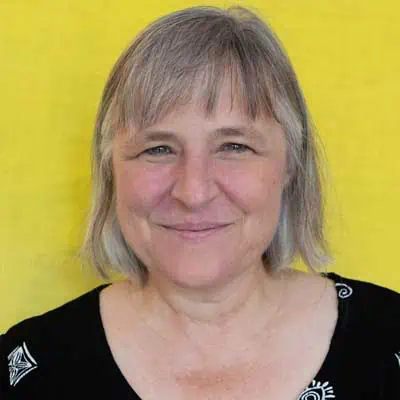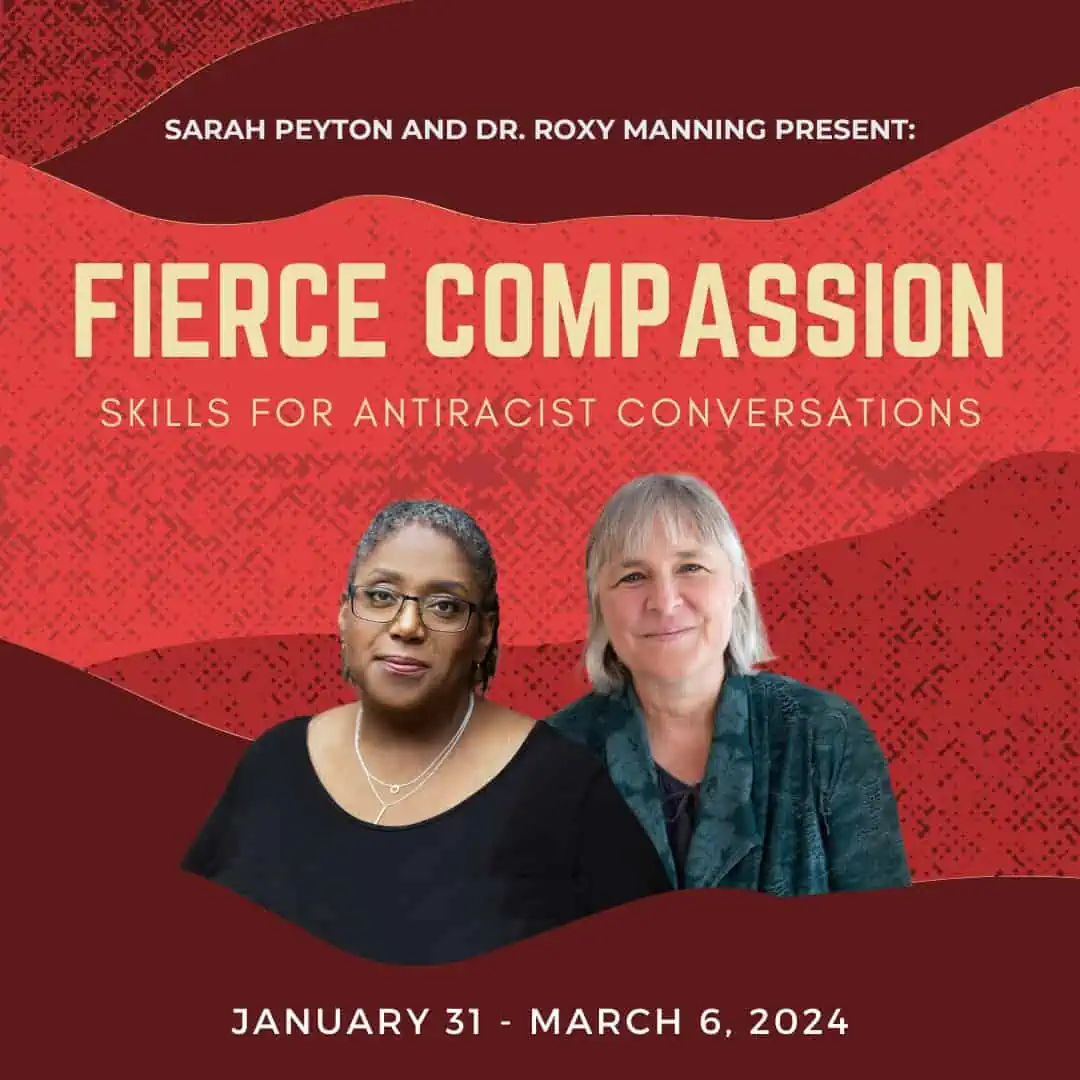Fierce Compassion: Skills for Antiracist Conversations
When you witness racism, do you feel helpless and uncertain about how to take fierce and compassionate action?
Join Roxy Manning and Sarah Peyton for 6 weeks, January 31st – March 6th, 8:00 AM-9:30 AM Pacific, to practice skills for antiracist conversations, based on Roxy’s new book How to Have Antiracist Conversations and the companion, The Antiracist Heart, co-authored with Sarah Peyton.
Are you ready to learn skills for brave and self-connected antiracist conversations, without collapse, burnout or self-contempt?
When you witness microaggressions, racist acts, or racist language do you feel helpless and uncertain about how to take fierce and compassionate action? Are you frozen and unable to voice your concerns even though your heart is yearning to intervene for yourself and others? Are you deeply committed to antiracism principles but find it perplexing and disconnecting when you hear others talk about it in ways that you don’t enjoy?
Based on Roxy Manning and Sarah Peyton’s new book series, How to Have Antiracist Conversations and The Antiracist Heart, this course will empower you and provide clarity, helping you cultivate a strong foundation and a fierce, compassionate resilience that will guide your actions. It is designed to support you, even if you’re unsure of where to begin or experience a sense of freeze and distress in response to racial harm.
This 6-week course supports people of all racial identities to learn and practice the dialogue skills of empathy and self-compassion process-work that supports fluidity, groundedness, and a capacity for action in the face of racist speech, unconscious bias, microaggressions and more.
Course Details:
Meetings Every Wednesday for Six Weeks, January 31st – March 6th, from 8 AM – 9:30 AM Pacific (convert your timezone here)
During this class series, participants will practice conversations with self, conversations welcoming rage, conversations with supporters, conservations with resistors, conversations across power differences and applied conversations.
Where do we meet?
The course will meet via online video conference (zoom). Recordings provided.
How is the Course Structured?
The course will include lecture and demonstrations, and break-out rooms to practice and embody antiracist dialogue skills.
Breakout Group Options for Global Majority Participants
- We acknowledge the unique challenges encountered by Global Majority people when engaging in this type of work in spaces that tend to be white dominant. These can include being asked to educate white participants about racism,discrimination, and social justice issues, being seen and treated as representatives of their entire race or ethnicity rather than being seen as individuals, and experiencing microaggressions such as having their opinions or experiences dismissed or minimized.
- Given that skills practice in breakout groups is a major component of this course, we want Global Majority participants to have choice about their group make-up when practicing this work.
- One strategy we will implement to support choice for Global Majority participants in this class is to offer the choice of opting into breakout groups that are for Global Majority people only.
- Global Majority-only groups will be supported by Global Majority assistants.
Support from Our Assistant Team:
- We will have a team of assistants who are skilled in offering empathic and resonant support and who hold a commitment to work towards anti-racist action.
- Our hope is that you would receive gentle and caring support to help address the blocks you encounter as you engage with this important work.
- If emotions such as shame, pain, or helplessness arise during our sessions, you can request one on one support in the moment from someone on our assistant team.
- Note: This work is not therapy and is not a substitute for therapy. If you have a sense that you would be destabilized by yourself or others speaking about difficult events, then this course may not be for you.
- While we hope that the processes and information that we share can be of use in your journey, we do not have the resources to support extreme psychological difficulties.
What Skills and Capacities Will You Learn and Practice?
This course is born from Roxy Manning’s new book, How to Have Antiracist Conversations, and the companion workbook, The Antiracist Heart, co-authored with Sarah Peyton. The books released on August 29th, and this course offers a unique practice space for antiracist activism by supporting more honest dialogues, removing the blocks to principled action, and supporting participants to become changemakers in the world.

You’ll practice and learn:
- Conversations with self, including an understanding of trauma, time travel and unconscious contracts
- The inner work of self compassion and moving through unconscious contracts that block action
- The importance of commitment to beloved community as the foundation for antiracism activism.
- Conversations welcoming rage, shame, anger and other emotions that often shunned in the conflict-averse tenets of white supremacy culture
- Conversations with supporters, including working with powerlessness and privilege
- The four dialogues of the Authentic Dialogue framework and considerations in choosing and preparing for each dialogue.
- Learning and practicing Roxy’s Authentic Dialog framework, including dialogues to be heard/seen and to invite mutual understanding
- Conservations with resistors, and the importance of understanding the neurobiology of bias + disgust
- Conversations across power differences
Praise for How to Have Antiracist Conversations:
Thank you, Dr. Manning, for providing these tools which so effectively blend the approaches of nonviolent communication with the principles of anti-racism. Your willingness to share your expertise and lived experience is creating positive change in communities across the country.
Dr. Manning shows us how we can have it all: express the truth of our experience while also contributing to genuine understanding and connection, transforming the ideal of Beloved Community into a daily practice. I’ve had the great good fortune to see Dr. Manning teach in person in many contexts, and I’m thrilled that the wider public will now have access to her work through her profound and deeply engaging writing. This book inspires me and gives me hope that we can do the hard, joyful, necessary work of building Beloved Community. Buy a couple of copies; you’ll want to share.
Dr. Manning’s book teaches, shares her personal and unique insights, and shines brilliantly with love, empathy and a passionate vision of Beloved Community for our world. Having worked in a variety of organizations as a lawyer, leader, and teacher for over 25 years in my profession, I found the clarity of Dr. Manning’s vision for what community, including our places of work, could look like if we truly commit ourselves to minimizing microaggressions and bias to be deeply moving. I invite you into personal transformation, to take a risk, and to join on this journey toward the creation of Beloved Community that this book calls us to become.
She brings insight, wisdom and the deep compassion that helps make these challenging topics accessible. If you want more than a good read, if you want the skills for actual change and integration, this book is a must.
How to Have Antiracist Conversations is a roadmap to racial healing, grounded in the practice of nonviolence and a commitment to reconciliation. In times of such uncertainty, this book is a much needed guide for us all.
I feel convinced it will inspire and concretely support anyone seeking to enact values for care, community and justice in this beautifully blessed and broken world of ours.
Sliding Scale Tuition Options
We are offering 4 tuition options:
- $500 – Supporter Rate: If you have financial assets, or identify as middle or upper/owning class, then this is the rate for you. Paying at this rate supports the discount and scholarship fund, making this course accessible to more people including people of the global majority.
- $375 – True Cost Rate: This is the true cost of the course. If you are able to pay this amount and still meet your basic needs, then this is the price for you to choose.
- $275 – Discounted Rate: The Discounted option is reserved for those who sometimes struggle with limited financial resources and would benefit from supported access to this learning experience.
- $200 – Scholarship Rate: The Scholarship option is reserved for people experiencing financial hardship and for people of the global majority.
If you are a member of the global majority or experiencing financial hardship and you need additional financial assistance to attend, please reach out to our team at [email protected].
We are delighted to offer CEU hours for this course
We are delighted to offer 9 CEU hours for psychologists and social workers for this course ($30 additional fee). Chicago Counseling Associates has been approved by the Illinois Department of Financial and Professional Regulation to sponsor continuing education for social workers and psychologists. CCA maintains responsibility for this program and its content. Live attendance is required to receive CEUs.
$200.00 – $500.00
Some additonal partial scholarships are available for members of the global majority, those experiencing financial hardship, or those in countries with limited earning power. Please write to [email protected] to inquire.
PLEASE NOTE:
- Your tuition payment is non-refundable and transferable.
- In the event that the course is postponed or canceled a full refund of tuition will be offered
- This work is not therapy and is not a substitute for therapy. If you have a sense that you would be destabilized by yourself or others speaking about difficult events, then this course may not be for you. While we hope that the processes and information that we share can be of use in your journey, we do not have the resources to support extreme psychological difficulties.
About the Instructors

Roxy Manning brings decades of service experience to her work interrupting explicitly and implicitly oppressive attitudes and cultural norms within individuals, communities, and organizations. Rooted in her experience as an Afro-Caribbean immigrant, Roxy brings a diversity of perspectives to her work that generates profound insights for transformative change. Roxy has worked and consulted across the U.S. with businesses, nonprofits, and government organizations wanting to move towards equitable and diverse hiring practices and workplace cultures, as well as with individuals and groups committed to social justice internationally.
As a facilitator, she’s thrilled by the process of holding opposing voices and ushering groups from discord towards values-driven solutions that work for everyone. Her own inner work coupled with her professional experience has grown her capacity to meet people with varying levels of education, disparate life experiences, and the most intense feelings in ways that help them feel heard, respected, supported, and loved. As a psychologist, she maintains a private therapy practice, and works in San Francisco serving the homeless and disenfranchised mentally ill population. As a Certified Trainer and assessor with CNVC, she works with folks from the Global Majority who are interested in NVC certification and creating ties with the global NVC network to create local communities that thrive. Read Roxy’s articles at her website. http://www.roxannemanning.com/

Sarah Peyton, Certified Trainer of Nonviolent Communication, author and neuroscience educator offers trainings focused on learning and using resonant language to transform the brain and heal trauma with exquisite gentleness and self-warmth.
Sarah speaks about both the personal and the systemic forces that lead to traumatization. She has a particular interest in the way human brains respond to power differentials and microaggressions, the social trauma that can result, and how to use resonant healing to support people in restoring dignity and reclaiming their full power.
Sarah teaches and lectures internationally and is the author of three books: Your Resonant Self: Guided Meditations and Exercises to Engage Your Brain’s Capacity for Healing, the companion Your Resonant Self Workbook: From Self-sabotage to Self-care, and Affirmations for Turbulent Times: Resonant Words to Soothe Body and Mind.

